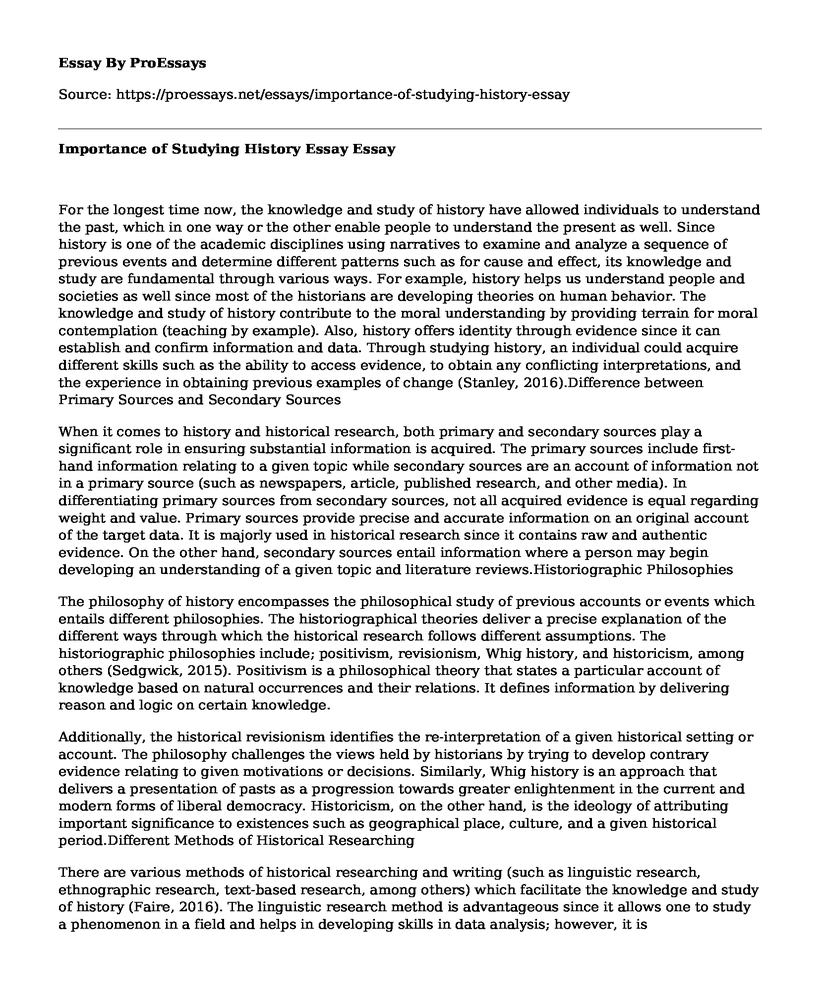For the longest time now, the knowledge and study of history have allowed individuals to understand the past, which in one way or the other enable people to understand the present as well. Since history is one of the academic disciplines using narratives to examine and analyze a sequence of previous events and determine different patterns such as for cause and effect, its knowledge and study are fundamental through various ways. For example, history helps us understand people and societies as well since most of the historians are developing theories on human behavior. The knowledge and study of history contribute to the moral understanding by providing terrain for moral contemplation (teaching by example). Also, history offers identity through evidence since it can establish and confirm information and data. Through studying history, an individual could acquire different skills such as the ability to access evidence, to obtain any conflicting interpretations, and the experience in obtaining previous examples of change (Stanley, 2016).Difference between Primary Sources and Secondary Sources
When it comes to history and historical research, both primary and secondary sources play a significant role in ensuring substantial information is acquired. The primary sources include first-hand information relating to a given topic while secondary sources are an account of information not in a primary source (such as newspapers, article, published research, and other media). In differentiating primary sources from secondary sources, not all acquired evidence is equal regarding weight and value. Primary sources provide precise and accurate information on an original account of the target data. It is majorly used in historical research since it contains raw and authentic evidence. On the other hand, secondary sources entail information where a person may begin developing an understanding of a given topic and literature reviews.Historiographic Philosophies
The philosophy of history encompasses the philosophical study of previous accounts or events which entails different philosophies. The historiographical theories deliver a precise explanation of the different ways through which the historical research follows different assumptions. The historiographic philosophies include; positivism, revisionism, Whig history, and historicism, among others (Sedgwick, 2015). Positivism is a philosophical theory that states a particular account of knowledge based on natural occurrences and their relations. It defines information by delivering reason and logic on certain knowledge.
Additionally, the historical revisionism identifies the re-interpretation of a given historical setting or account. The philosophy challenges the views held by historians by trying to develop contrary evidence relating to given motivations or decisions. Similarly, Whig history is an approach that delivers a presentation of pasts as a progression towards greater enlightenment in the current and modern forms of liberal democracy. Historicism, on the other hand, is the ideology of attributing important significance to existences such as geographical place, culture, and a given historical period.Different Methods of Historical Researching
There are various methods of historical researching and writing (such as linguistic research, ethnographic research, text-based research, among others) which facilitate the knowledge and study of history (Faire, 2016). The linguistic research method is advantageous since it allows one to study a phenomenon in a field and helps in developing skills in data analysis; however, it is disadvantageous since it is often based on hypothesis making it difficult to research a non-existent phenomenon. Also, it could take longer since it mostly uses human participants. Text-based research delivers a wide range of information and does not rely on finding participants; however, it could be biased since it is based on text researching.
Conclusion
Comparatively, ethnographic research is advantageous in researching and writing since it may develop language skills, knowledge of applying qualitative research methods, and allows one to reflect on their own experience. As a disadvantage, ethnographic research is more complicated than multiple types of historical researching. In conclusion, I think ethnographic research is the best since it gives a wide range of learning and may provide studies on more unconventional topics.
References
Faire, L. (Ed.). (2016). Research methods for history. Edinburgh University Press.
Sedgwick, S. (2015). Philosophy of history. The Oxford Handbook of German Philosophy in the Nineteenth Century, 436.
Stanley, M. (2016). Why study history. Physics Today, 69(7), 38-44.
Cite this page
Importance of Studying History Essay. (2022, Aug 15). Retrieved from https://proessays.net/essays/importance-of-studying-history-essay
If you are the original author of this essay and no longer wish to have it published on the ProEssays website, please click below to request its removal:
- Letter of Complaint About a Zero Grade for Essay
- Assignment Example on Using the Scientific Method to Challenge our Thinking
- Generating Funds in the New York City State Schools Essay
- Essay Example on Spartan Hegemony: Unsuccessful & Athenian Alliance/League Difference
- Essay Sample on English Stress & Intonation: Enhancing Word Understanding
- Paper Sample on Help Children Living with Schizophrenia Adapt to Society
- Free Paper on Shifting Paradigms: Examining Asian Students' Trend Towards Higher Education in Germany







